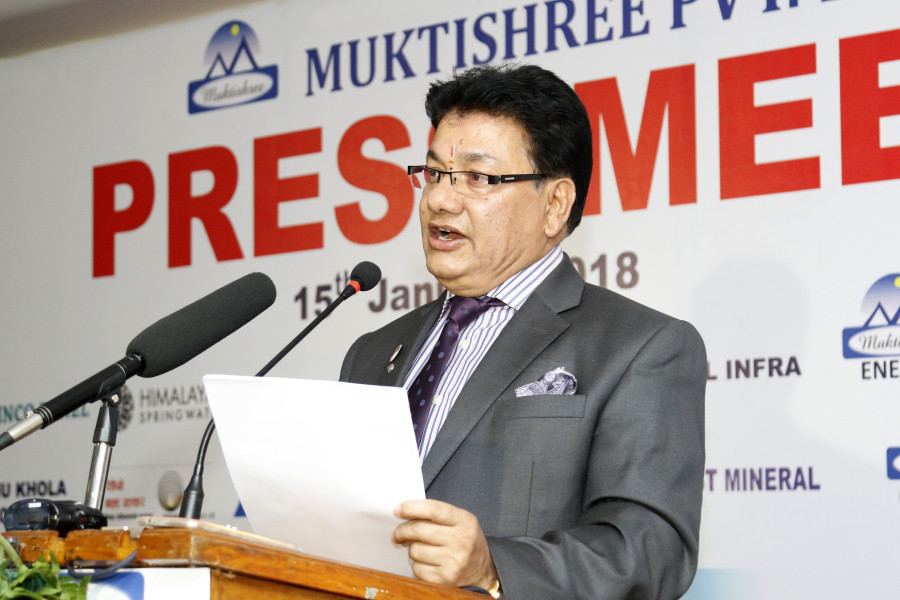National
How businessmen used Ncell to launder black money to Nepal
When Ncell was sold for the 12th time in 2016, some of the country’s leading members of parliament, and members of the government and the judiciary were mired in Nepal’s biggest tax evasion scandal.
Arpan Shrestha
Update: Months after the Center for Investigative Journalism-Nepal published its report, it updated one of its stories with a lengthy clarification on its website. In the updated version of its story, CIJ addressed concerns by Niraj Govinda Shrestha, one of the businessmen named in the story, and said that it never reported that Shrestha did not disclose the source of his investment and that it was his partners who had investments abroad and used that medium to bring foreign investment in Nepal. Despite the clarification, CIJ-Nepal has not removed Shrestha's name from its stories.
Shrestha has denied any wrongdoing and contested the reporting by CIJ-Nepal in a formal letter to the government's press regulatory body. In a separate interview with The Kathmandu Post in January 2020, Shrestha once again denied allegations that he's used his foreign companies to launder money into Nepal. He also said that he paid Rs280 million in taxes following the sale of his Ncell shares, and a case is currently pending in the Supreme Court over his disagreement with the Large Taxpayers' Office, which had said he owes Rs11 billion.
We have also removed Shrestha's name in a sentence that said a prominent businessman had used his company to launder money. For full transparency, you can check the original version of this story here.
***
When Ncell was sold for the 12th time in 2016, some of the country’s leading members of parliament, and members of the government and the judiciary were mired in Nepal’s biggest tax evasion scandal. Now, an investigation by the Centre for Investigative Journalism-Nepal shows how the nexus of businessmen, foreign nationals and politicians set up offshore companies and used the country’s major mobile network operator to launder black money under foreign direct investment and repatriate the profit to foreign countries and launder the money back.
The investigation reveals that controversial businessman Ajeya Raj Sumargi of Muktishree Group, Birendra Mahato, a former lawmaker and central committee member of the Sanghiya Samajbadi Forum-Nepal, and his elder brother and businessman Upendra Mahato are involved in the scam.
On May 25, 2007, Upendra Mahato, founding president of the Non-resident Nepali Association and Nepal’s former honorary consul for Belarus, and 11 foreign nationals set up a company called Tipologia, which has already invested $1,671,091 under FDI in Nepal.
Romeo Abdo, one of its investors, is a businessman of Lebanese origin operating in Belarus since 1997. He was the chairman of Ncell (June 2006-March 2012) when TeliaSonera had invested in it. This is the time when Mahato bought 20 percent shares in Ncell.
On July 16, 2008, Pankur Finance and Spartley Ventures were registered in the British Virgin Islands (BVI) by Mossack Fonseca, a Panamanian intermediary law firm which found itself at the centre of a global scandal following #PanamaPapers. The ICIJ in 2017 revealed Mahato’s investments in tax haven countries.
Mahato has investments in these two companies, including New Found Strategies, also registered by Mossack. Formia and Primi Limited, two other companies registered in Seychelles have investments in Pankur and Spartley.
Mahato and Abdo also have joint ventures such as Spartley Ventures, a Belarusian-Nepali-Kazakhstan Group Limited in Belarus. Mahato first invested in Ncell through Synergy Nepal Private Limited. Later, he sold the 20 percent share in Ncell to himself. A total of Rs3 billion in tax amount was evaded when Synergy sold the shares, according to a report by the Large Taxpayers’ Office.
On March 29, 2012, Mahato sold his 20 percent share to non-resident Nepali Niraj Govinda Shrestha, his offshore company partner, according to a report by Large Taxpayers’ Office. Shrestha is also one of the investors with Mahato and Abdo’s joint venture in Belarus. A 2018 investigation by a Belarusian journalist Stas Ivashkevich reveals his investments in more than a dozen companies in foreign countries and has invested in tax haven countries.
Together with Abdo’s younger brother Michel Abdo, Shrestha had registered a company called Nostal Business Corp in the BVI, which attracted FDI in Setko International, a company in Belarus. Shrestha, Mahato and his younger brother Birendra Mahato, a former lawmaker and central committee member of the SSF-Nepal and Abdo are board members of the Amkodor Holding Company in Belarus.
Shrestha, who owned 20 percent shares when TeliaSonera sold its 80 percent stake in Ncell to the Malaysian company Axiata, later sold his 20 percent shares to Nepali citizen Bhawana Singh Shrestha. According to the Large Taxpayers’ Office, a tax amounting to 11 billion rupees was evaded in the transaction. Shrestha contested the ruling in the Supreme Court, which issued an interim order to not recover the tax dues from the company, which has stalled the payment process.
According to documents obtained by Cypriot journalist Stelios Orphanides, affiliated with the ICIJ, Nepal’s controversial businessman and current honorary consul for Belarus, Ajeya Raj Sumargi of Muktishree Group and its director Arjun Sharma and 11 other foreign nationals are investors of Airbell Services Limited in Cyprus, a company founded in 2008. Magnumserve Limited, an intermediary law firm had facilitated to incorporate Airbell in Cyprus.
Dubai based Mohammed Amersi, who is one of the 11 investors of Airbell, was a senior advisor to TeliaSonera Group and board member of Spice Nepal Private Limited, the investor of Mero Mobile, which was rebranded in March 2009 as Ncell. According to the documents obtained by Orphanides, Amersi also owns the Rural Shores and Inclusive Ventures Limited Company in India, the same company that Mukitshree Group had announced a partnership in 2014.
Zhodar Investments Limited, registered at the BVI on May 12, 2010, by Trident Trust, an intermediary law firm, purchased the share of Airbell. According to French journalist Maxime Vaudono, who also worked on the #PanamaPapers, the Financial Services Commission, a regulatory agency in the BVI confirmed Sharma as its director.
On May 23, 2011, Zhodar and Sumargi’s Nepal Satellite Telecom Private Limited signed an agreement, which also mentions Sharma as Zhodar’s director.
Sumargi has laundered money from Airbell, Zhodar and Tipologia under FDI. Between 2008 and 2013, he transferred a total of $63,185,533 in nine instalments from Airbell to his companies.
Zhodar has funnelled a total of $48,372,222 under FDI to various Nepal-based companies owned by Sumargi, which has also attracted FDI from Tipologia, which appears to be associated with many offshore companies in the BVI.
In 2011, Maria Abdo, wife of Romeo Abdo, also deposited $249, 968 in Muktishree’s Nabil Bank Account 0201017501150.
When the CIJ-Nepal contacted Mahato for associations with Sumargi and offshore companies like Airbell, Zhodar and TeliaSonera, Mahato declined to comment and said he had “no information about it”.
In 2011 and 2012, Zhodar sold 510 and 1,000 units of share to TeliaSonera Asia Holding BV, which evaded taxes in Nepal, while operating Ncell.
On September 12, 2013, TeliaSonera Norway Nepal Holdings bought 20 units of share worth 15.2 million euros (around Rs2 billion) from Sumargi’s Airbell, according to the Office of Company Registrar in Cyprus.
Six days later, it again bought another 40 units of share worth 29 million euros (Rs3.98 billion) from Airbell.
The time period of these acquisitions and its investment in Ncell through holdings companies is the same.
On November 22, 2013, Zhodar transferred 1,060 units of its share to World Wide Incredible, another BVI registered company. On the same day, the company joined Sumargi’s Airbell Services as a partner.
TeliaSonera, linked to all these companies through cross holdings, invested in Ncell in Nepal and sold it to another company after eight years of operation. It evaded capital gains tax worth 61 billion rupees (now Rs73 billion).
TeliaSonera was found to have written a thank you letter to PM Oli during his last tenure and had PMs Pushpa Kamal Dahal and Sher Bahadur Deuba’s backing. The letter reads, “We will carry on with our talks with Nepal’s authorised agencies to settle the issue of repatriation of our profit. We are grateful for your support and cooperation.”
In 2016, then PM Dahal proposed his intention in a Cabinet meeting to tax TeliaSonera for the purchase of NCell and exempt the latter of taxes, which attracted huge opposition from three government secretaries. Later, during PM Deuba’s tenure, he neither favoured tax exemption nor took any measures to recover the tax dues.
Till date, Sumargi has repatriated $120 million to Nepal. The investigation by the Department of Money Laundering Investigation is ongoing but there have been a series of events which have raised attention.
The 54th report of the Office of Auditor General of Nepal states that Sumargi evaded tax on two occasions—the first amounting to 955 million rupees and the second 453.8 million rupees. According to the report, tax amounting to 1.4 billion rupees approximately was evaded while selling his shares in Nepal and abroad.
In January 2018, a single bench of justice Tej Bahadur KC issued a stay order to allow Sumargi to withdraw money, the source of which, according to the Nepal Rastra Bank, is unclear. In December 2018, another stay order was issued by justice Deepak Raj Joshee, which allowed Muktishree Industries to withdraw the money frozen by the central bank.
But on January 8, a division bench of Chief Justice Cholendra Shumsher Rana and justice Ananda Mohan Bhattarai quashed the stay order and ordered the central bank to recover the money from Mukitshree Cement and maintain the balance of $6.99 million.
The money, however, has already been withdrawn from the company’s account at Nepal Investment Bank Limited and it is unclear how the money can be recovered.
Read: These are the Nepali—and non-resident Nepali—elites with investment in offshore companies




 14.12°C Kathmandu
14.12°C Kathmandu














